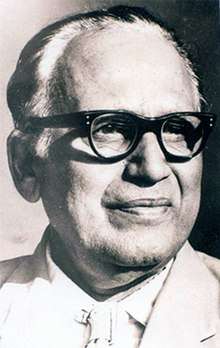Pralhad Keshav Atre
Prahlad Keshav Atre (![]()
Prahlad Keshav Atre | |
|---|---|
 | |
| Born | 13 August 1898 Kodit Khurd, Pune district, Maharashtra |
| Died | 13 June 1969 (aged 70) Mumbai, Maharashtra, India |
| Other names | Acharya Atre |
| Education | Bachelor of Arts |
| Alma mater | University of Pune University of London |
| Occupation |
|
Biography
Early life
Acharya Atre was born on 13 August 1898 in a Deshastha Brahmin[1] family of Kodit Khurd, a village near Saswad in Pune district. His father was a clerk and also a secretary of Saswad Municipality for a brief period and his uncle was teacher at MES Waghire High School Saswad. He completed his primary and High School education from MES Waghire High School,Saswad.He matriculated from Fergusson college in 1919. He completed Bachelor of Arts from University of Pune. After graduation Atre took up a career as a school teacher. Atre did his T. D. (teacher's diploma) from the University of London in 1928.[2] Before returning to India he studied Experimental Psychology under Cyril Burt and taught at Harrow.[3]
Film and theatre career
His Marathi film, Shyamchi Aai won the 1954 National Film Award for Best Feature Film.[4] Atre wrote seven plays; some of them had a humorous theme while others, a serious one. All of them received high public acclaim. His comedy-play, Moruchi Mavshi was later adapted into Hindi film, Aunty No. 1 (1998), starring Govinda and Raveena Tandon. His movie Mahatma Phule (1955) received the President's Silver Medal.
Writing and Publishing
Atre was the founder–editor of four Marathi newspapers. Two of them had a short life. But the other two, Maratha and (Weekly) Navayug, ran for many years with a large circulation.
Political career
- Member of Sanyukta Maharashtra Samiti during 1956–60. He was arrested in 1956 under the Preventive Detention Act for his agitation.
- Member of Maharashtra Vidhan Sabha from Dadar constituency (18) 1962–1967[5]
However his ambition of becoming a member of the Indian Parliament could not be fulfilled as he lost these elections.
Important works
Plays
- Sāshtāng Namaskār (1935)
- Gharābāher (1934)
- Bhramāchā Bhopalā (1935)
- Udyāchā Sansār (1936)
- Lagnāchi Bedi (1936)
- Moruchi Māwashi (1947) a Marathi comedy play
- To Mi Navhech (1962)
Novels, Biographies, and Essays
- Chāngunā (1954)
- Battāshi Wa Itar Kathā (1954)
- Mahātmā Jyotibā Phule (1958)
- Suryāsta (1964) (On the life of Jawaharlal Nehru)
- Samādhiwaril Ashru (1956)
- Kelyāne Deshātan (1961)
- Atre Uwāch (1937)
- Lalit Wāngmaya (1944)
- Hashā Āni Tālyā (1958)
- Mi Kasā Jhālo (1953)
Movies
- Brahmachari (1938)
- Shyāmchi Aai (1953)
- Premveer (Script writer)
- Dharmveer (Script writer)
- Brandichi Bātali (Script writer)
- Paayaachi Daasi (Hindi: Charanon Ki Daasi). Producer.
- Mahātmā Phule
- Parinde (Hindi, Director under name of Principal Atre) (1945)
Journalism
- Founder/Editor of (weekly) Sāptāhik Navyug (1940–1962) and Tukārām (1954)
- Evening newspaper Jai Hind (1948)
- Daily Marāthā (1956 – Till the end)
Honors
Awards
- National Film Awards (India)
- 1st National Film Awards (1953) – President's Gold Medal for the All India Best Feature Film – Shyamchi Aai[6]
- 2nd National Film Awards (1954) – President's Silver Medal for Best Feature Film in Marathi – Mahatma Phule[7]
References
- The Illustrated Weekly of India, Volume 95. Bennett, Coleman & Company, Limited, at the Times of India Press. 1974. p. 31.
Marathi literature is strewn with Deshastha writers. Some of the luminaries are B. S. Murdhekar, the neo classical poet and critic; the popular dramatists Acharya P. K. Atre, V.V.Shirwadkar; the poet and story writer G.D.Madgulkar popularly known as the "Modern Walmiki" of Maharashtra, Sahitya Akademi Award winners G. T. Deshpande, Laxmanshastri Joshi, S. N. Banhatti, V. K. Gokak and Mugali all belong to this community.
- Jaquir Iqbal (October 2009). Sunita Deshpande (ed.). Encyclopedic dictionary of Marathi literature. Global Vision Publishing House. pp. 37–38. ISBN 9788182202214. Retrieved 1 October 2009.
- Ashish Rajadhyaksha; Paul Willemen (10 July 2014). Encyclopedia of Indian Cinema. Routledge. p. 47. ISBN 9781135943189. Retrieved 10 July 2014.
- Awards IMDb
- "STATISTICAL REPORT ON – GENERAL ELECTION, 1962 – TO THE LEGISLATIVE ASSEMBLY OF MAHARASHTR" (PDF). Retrieved 7 June 2012.
- "1st National Film Awards" (PDF). Directorate of Film Festivals. Retrieved 21 August 2011.
- "2nd National Film Awards" (PDF). Directorate of Film Festivals. Retrieved 10 March 2012.
- Prahlad Keshav Atre, by A. N. Pednekar. Sahitya Akademi Publications. ISBN 81-260-1570-5.